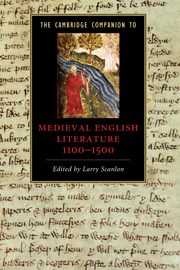15 - John Lydgate
from Part II - Authors
Published online by Cambridge University Press: 28 November 2009
Summary
Study of the writings of John Lydgate offers attractive, multiple challenges for scholars of Middle English at all levels. Certainly the bibliographical and textual work on the Lydgate corpus done in the first half of the twentieth century made critical reassessment possible. And certainly the readiness of historicist scholarship, over the last twenty or so years, to define the cultural function of literary (and non-literary) texts has opened new paths to Lydgate's work. These paths were closed as long as New Criticism was the gatekeeper of scholarly interest, since Lydgate's many larger-scale works responded poorly to detailed formalist analysis. The correlative extension of interest in Middle English studies from the late fourteenth into (in one development at least) the fifteenth century has, further, prepared the ground for renewed consideration of Lydgate's oeuvre. Despite these enabling scholarly advances, the challenges offered by Lydgate remain under-exploited and attractive: consideration of so much of the large corpus remains inchoate, and, for those who enjoy the challenge of persuading readers that a previously ignored or dismissed text deserves attention, there is plenty of enjoyment to be had.
A brief bio-bibliography will help situate this writer. John Lydgate ( c. 1371-1449) was born in Lydgate, Suffolk, from which he took his name. He entered the Benedictine abbey of Bury St. Edmunds as a boy. Between 1389 and 1397 he passed through the range of orders from acolyte to priest. Lydgate is not recorded as having taken a degree, but he was certainly in Oxford at Gloucester College, c. 1406-8, possibly much longer. His connection with Prince Henry began before Henry's accession as Henry V in 1413: already in 1412 Lydgate began his ambitious narrative of the Trojan War, the Troy Book, finished in 1420.
- Type
- Chapter
- Information
- The Cambridge Companion to Medieval English Literature 1100–1500 , pp. 205 - 216Publisher: Cambridge University PressPrint publication year: 2009
- 2
- Cited by



